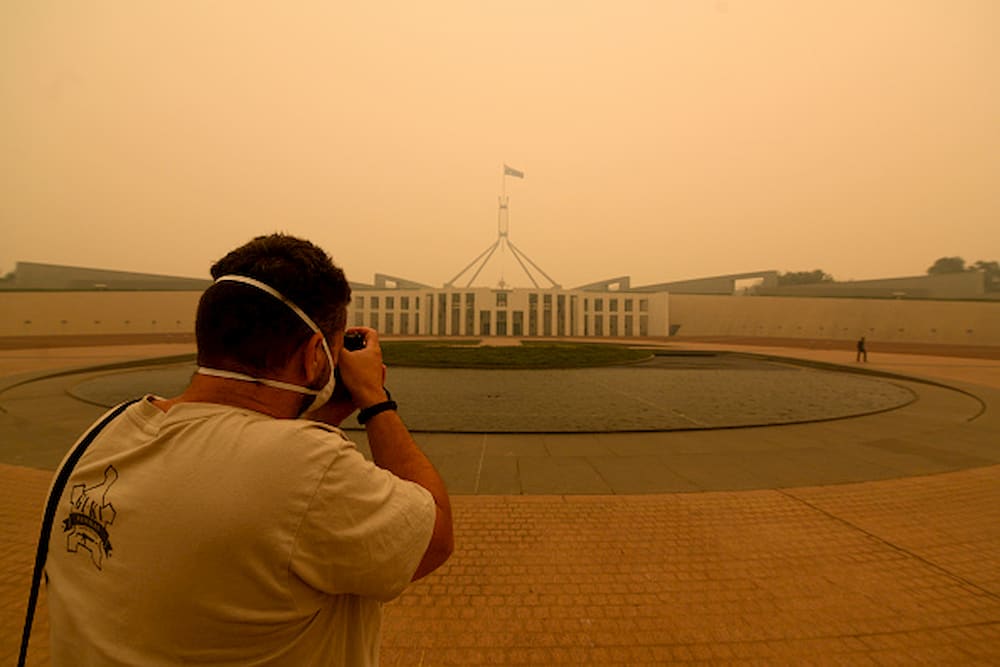The full mental and physical health effects of the 2019/2020 Australian bushfires may not be known for many years, but an Australian Institute of Health and Welfare (AIHW) report has shown a short-term increase in respiratory issues.
The Black Summer bushfire season directly cost 33 people their lives, created substantial property loss, prompted mass evacuations and blanketed parts of Australia, including the ACT, in smoke.
AIHW data from September 2019 to March 2020 showed poor air quality affected much of the Territory’s population, but the effect of smoke on local hospitals and patients was of “particular concern”.
Documents released under the Commonwealth Freedom of Information Act described staff across several ACT hospitals and health services experiencing “difficulty breathing, and dizziness” caused by smoke entering buildings, and reported the air in some indoor areas was “virtually unbreathable”.
From 6 to 8 January 2020, smoke infiltrated some critical care areas of the Canberra Hospital and particle matters in the air (PM2.5 levels) in some high-risk patient areas ranged from “unhealthy for sensitive groups” to “unhealthy for all” according to Territory standards.
The report continues, saying some sterile medical equipment was affected or damaged by smoke infiltration and had to be removed from hospitals, and some imaging equipment was unable to be used due to smoke damage.
Documents provided to AIHW under the Freedom of Information Act indicated poor air quality affected those already being in hospitals and generated more need for treatment.
Between 20 December 2019 and 12 January 2020, 166 people presented to ACT hospital emergency departments reporting “smoke-related” symptoms.
Territory pharmacy sales of inhalers increased by 194% in the week beginning 29 December 2019 compared with sales figures for the same week in the previous year, and 204% for the following week beginning 5 January 2020.
Australian National University (ANU) Professor of Health Equity, Sharon Friel, said there must be a “whole of government response” with good social, planning and climate adaptation policies to fully address the health effects of extreme weather events.
“Now, the heart attacks, strokes, and respiratory failure resulting from the exposure of thousands of Australians to extreme heat, fires and smoke, and the mental health aftermath is likely to overwhelm an unprepared health system,” she said.
University of Tasmania research estimated smoke-related health costs were around $1.95 billion; the AIHW said that figure is unprecedented and nine times higher than the median of the previous 19 bushfire seasons.
Widespread smoke across the ACT impacted several services and national institutions and, when the air quality was at its worst, some government organisations were shut down.
These included the High Court, the National Portrait Gallery, the ANU, the University of Canberra, and the Department of Home Affairs offices.
Australia Post temporarily suspended deliveries to Canberra, and flights to and from Canberra were cancelled for a short time.
ANU Centre for Epidemiology and Population Health, Professor of Global Environmental Health, Sotiris Vardoulakis, said decarbonising our economy would lead to decreased air pollution and fire risk.
“Although we cannot directly attribute every bushfire to climate change, the scientific evidence strongly suggests that our warming climate has substantially increased the frequency of extreme fire weather and the risk of bushfires,” he said.
“Decisive action to tackle climate change by curbing carbon emissions will reduce the risk of fires and save lives.”



